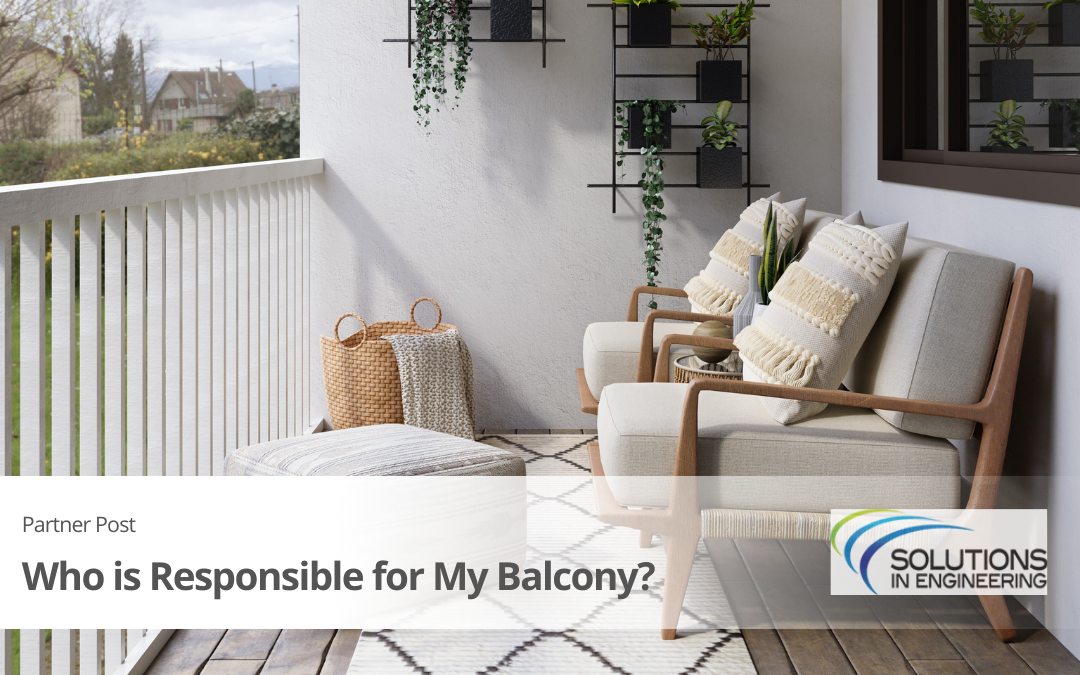This month, we have partnered with Solutions in Engineering to answer one of the most common questions we get – am I responsible for the maintenance of my balcony?
A question often raised with us at strata owners’ seminars is ‘who is responsible for my balcony, is it common property?’
Whilst the doors leading onto the balcony are obviously the unit owner’s responsibility, many owners are surprised when the answer comes back ‘it depends’. It will depend on the plan type, for example a BFP (Building Format Plan) verse a SFP (Standard Format Plan).
BFP: The easiest way to explain this is if a person lives above and/or beneath your unit.
SFP: If no one lives above or below you e.g. townhouse /villa then you are likely to be responsible.
Note: The ‘it depends’ that may apply to the above examples is a townhouse scheme can also be registered as a BFP. You can find this out by viewing the registered plans.
With a BFP the body corporate has control of the maintenance of the balconies. Even though they’re the sole use of the unit owner. From a maintenance and aesthetics perspective, the body corporate needs to maintain control. If the balustrade requires replacing, then this becomes a body corporate matter. If the water proofing membrane located under the balcony tiles fails, then it becomes a body corporate matter. This is because any water ingress could result in severe damage to the super-structure of the building as this is one method of how concrete cancer starts. Water makes its way through the concrete into where the reo (the steel mesh on the inside of the balcony floor used to improve the tensile strength of any concrete) sits. Unfortunately, steel and water are just not good friends. Steels Achilles’ heel Rust soon sets in, leading eventually to the reo failing to support the concrete balcony floor resulting in huge repair costs.
When unit owners do not undertake routine or preventative maintenance then this could lead to serious injury or even death from a fall. Sometimes it is because the owners have not put enough money away for future non recurrent maintenance costs. This is one reason that in 1996 Qld legislated to introduce mandatory Sinking Fund Forecasts (SFF) for all body corporate schemes. Every other state has since followed Qld’s lead and implemented their version of a SFF. Why? Because having a fund to cover maintenance and replacement costs of the building assets as the useful life expectancy of the asset comes to an end simply makes good sense. It means that owners are not looking for large sums of money (Special Levies) but rather, like a savings scheme, we put away a little each quarter that builds to be available to cover anticipated costs when they fall due.
This allows the body corporate to repair or replace building items such as balcony water proofing membrane or balustrades that have failed in a timely manner. In the advent of an emergency such as the balustrade becoming unsafe, the BC Committee can take control of the maintenance instead of waiting for an owner to deal with it. Therefore potentially minimizing a falling risk.
What can be stored on the balcony?
First thing is to have handy a copy of your schemes CMS (Community Management Statement) and make yourself familiar with the By-laws. Most By-Laws state that clothing or towels can’t be hung out to dry as they affect the overall look of the complex. The By-Laws should also state that nothing that can create a climbable object nor should be placed anywhere near to the balcony’s balustrade, as this could allow a child to climb over resulting in a potential fall from heights.
Most unit owners have the usual items such as a table, chairs, pot plants, etc. some units the air conditioning condenser has been installed on the balcony. Please check that the condenser is not located too close to the balustrade (barrier) as it could then be a climbable hazard. As a rule of thumb work back in an arc 900mm from your balustrade. If the condenser is too close, then consider how this could be made safe e.g. install screens (that allow adequate ventilation) with non-climbable elements around or in front of the AC Condenser unit.
To Summarize – Is my balcony common property? The responsibility will be in the by-laws and the type of building format that is registered. To confuse owners a little more Townhouse schemes can be registered as a BFP so you can’t assume you’re a SFP you must check the registered plans.
In the 11 years from 2002 to 2012, data collected by the Queensland Injury Surveillance Unit (QISU) has recorded 936 presentations to participating emergency departments resulting from falls from a balcony. The QISU data represents less than a quarter of all paediatric presentations in Queensland resulting from a fall. Furthermore, QISU data is not collected in the Gold Coast and Sunshine Coast areas where high rise developments predominate.
The stats sited above should be motive enough to maintain and make safe your balconies. Regardless of the format plan your unit is in, maintenance is the key to increased security, increased return on investment and makes for a safer, happier community in which to live.
